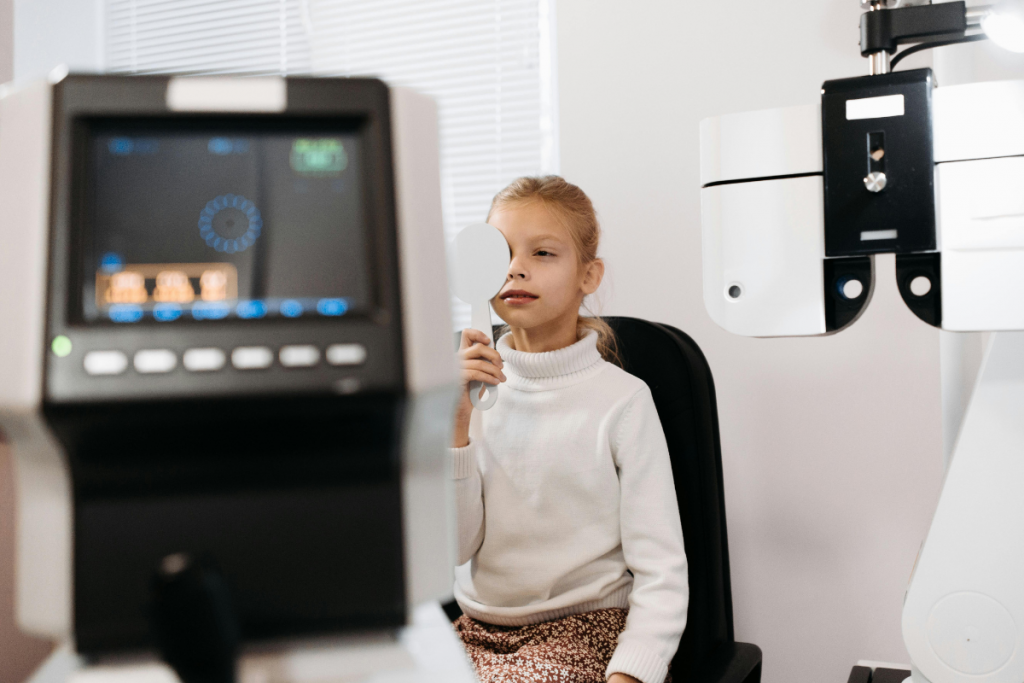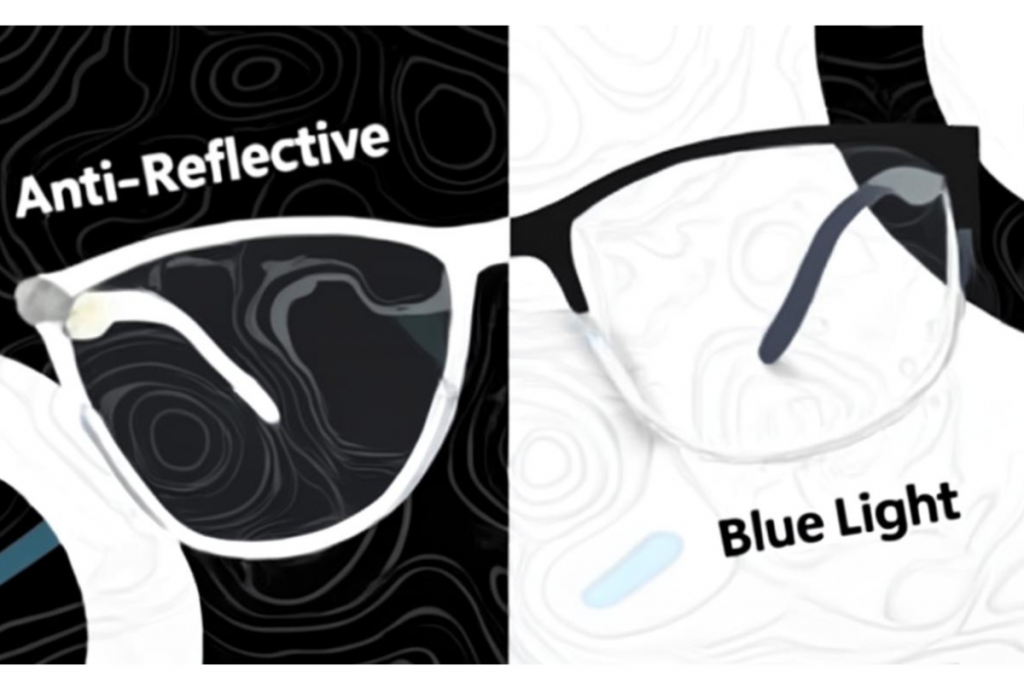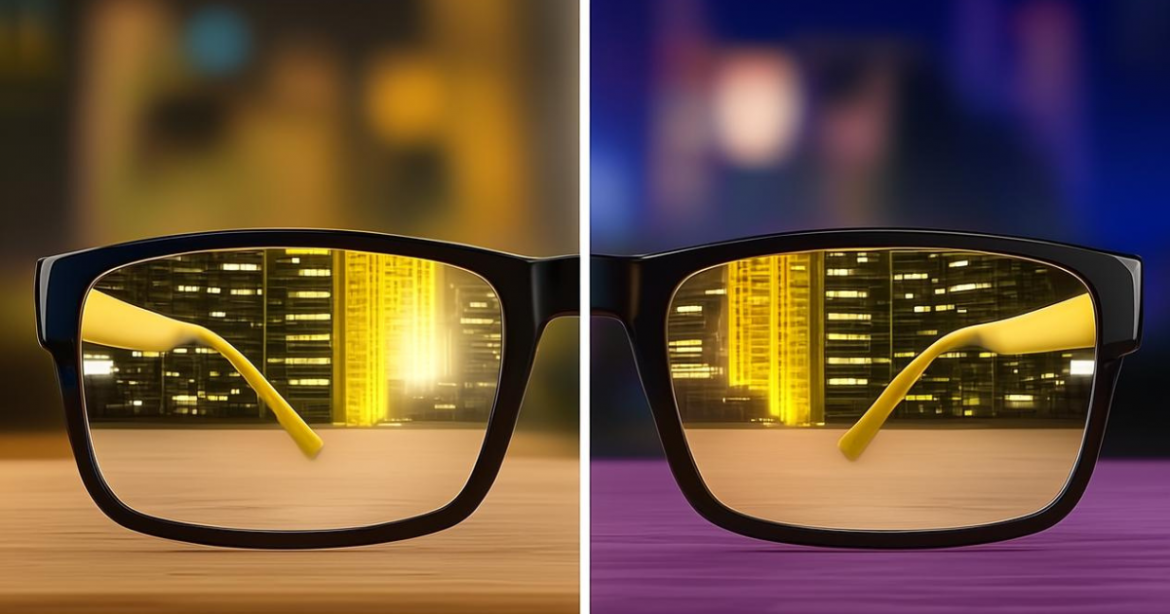People in Dubai, where working hours often go late into the night and car trips take place on desert roadways, often complain about eye strain. A lot of people have wondered, “Can you have anti-glare and blue light glasses?” or “Do anti-glare glasses block blue light?”
Let’s talk about how blue light and anti-glare lenses can keep your eyes safe, make you more comfortable, and help you get more done in the UAE, where life is fast-paced and full of screens.
What Are Blue Light Blocking Lenses?
Blue light protection glasses are made to block high-energy visual (HEV) blue light that comes from digital screens, smartphones, computers, and even LED lights.
Blue light blocking glasses, also known as blue light filtering or blue cut glasses, are glasses with specific lenses that are meant to keep blue light from getting to your eyes.
As screens are everywhere in our digital world, these glasses have become a prominent topic of conversation for helping with possible eye strain and sleep problems.
Benefits of wearing blue light blocking lenses
- Help with migraines and trouble sleeping
- Could help the body make melatonin at night
- Perfect for kids who need blue light-blocking glasses while learning online
As more kids and adults in Dubai spend time in front of screens, blue cut lenses are becoming more important.
Blue Cut Lenses
Blue cut lenses are meant to block off high-energy visual (HEV) blue light, which comes from the sun, screens, and LED lights.
Long-term exposure to blue light can change how much melatonin your body makes, which can cause digital eye strain and mess up your sleep patterns.
Blue cut lenses lower this exposure, giving people who spend a lot of time on digital gadgets an extra layer of protection.
In the optical industry, “blue cut lenses” is a typical phrase for eyeglass lenses that are made to block or filter out some of the high-energy visual (HEV) blue light.
More and more people are spending time in front of digital screens like smartphones, computers, tablets, and LED TVs, which has made these lenses quite popular.
What Are Anti-Glare Lenses?
Anti-glare glasses, also known as Anti-Reflective (AR) coated glasses, are glasses that have a thin, clear coating on the lenses.
The main job of this coating is to stop reflections from the front and back of your eyeglass lenses so that more light can get through to your eyes.
Benefits of wearing anti-glare lenses
- Less strain on the eyes: great for lengthy periods of time in front of screens or bright lights.
- Better Vision: Blocks away reflections so you can see better and more comfortably.
- Better Driving at Night: Cuts down on glare from headlights and streetlights.
- More Comfortable Eyes: This helps keep your eyes from getting weary, dry, or inflamed.
- Look Better Too: When you take pictures or talk to someone in person, your glasses won’t reflect light.
Anti-Glare Lenses
Anti-glare or anti-reflective (AR) lenses are made to cut down on reflections on the surface of the lenses. This lets more light through, which makes eyesight crisper.
They are especially helpful when glare can make it hard to see, including when driving at night, reading in strong light, or working in well-lit areas.
How Blue Light Blocking Lenses Work
We are always exposed to blue light via our phones, laptops, tablets, and even LED lights. Have you ever thought about why your eyes feel fatigued after a long day of looking at a screen? Or why it’s difficult to fall asleep after looking at your phone at night? That’s where glasses that block blue light come in.
But how do they really work?

The lenses in blue light blocking glasses filter out high-energy blue light from screens, LED lights, and the sun. These lenses either soak up or bounce off the blue light, which makes it less likely to get to your eyes.
This helps keep you from getting headaches, digital eye strain, and trouble sleeping from spending too much time in front of a screen, especially at night.
The lenses in blue light blocking glasses are made to filter out or absorb some of this blue light.
They do one of the following, depending on the type of lens:
Block Blue Light Completely
These are usually seen in glasses with yellow or amber lenses. These are useful for folks with sensitive eyes and for using screens a lot at night.
These lenses are clear or slightly tinted and are great for everyday wear, especially if you work on screens all day. They block out harmful blue-violet radiation.
What happened? Less blue light gets to your eyes, which can help keep your sleep cycle more natural and lower the risk of strain.
How Anti-Glare Lenses Work

Anti-glare lenses, which are more correctly called Anti-Reflective (AR) coated lenses, are a modern optical wonder.
They are made to cut down on reflections on the front and rear of your eyeglass lenses by a lot. This lets more light through to your eyes, making your vision clearer and more pleasant.
The Problem: Reflections You Don’t Want
When light hits a clear surface, such as an uncoated eyeglass lens, a little amount of it doesn’t go through. It doesn’t go through; it bounces off the surface.
For a regular plastic lens, this can be about 8% of the light at each surface (front and back), which means that a lot of light is reflected away from your eyes.
For the person wearing them
They make it hard to see clearly and strain the eyes because they generate glare from overhead lights, computer screens, automobile headlights, or sunshine. You might notice “ghost images” or halos around things that give off light.
For other people, reflections on your lenses can make it hard for them to see your eyes, which can make it hard for them to perceive your expressions, especially when you’re talking, video calling, or taking pictures.
Anti-Glare vs. Blue Light What’s the Difference?
Anti-glare lenses cut down on glare and reflections from screens, lights, and glass surfaces. This is fantastic for driving and seeing clearly.
Blue light filtering lenses remove harmful blue light from digital devices to help your eyes feel better and help you sleep better. You can wear both together for maximum protection.
| Feature | Anti-Glare Lenses | Blue Light Blocking Lenses |
| Main Purpose | Reduces glare and reflections from screens, lights, and glass | Filters out harmful blue light from digital screens and LEDs |
| How It Works | Coating on the lens minimizes light bouncing off the surface | Special lenses absorb or block blue-violet light wavelengths |
| Best For | Driving at night, office lighting, photo clarity, eye comfort | Long screen time, digital eye strain, sleep improvement |
| Helps With | Glare, visual distractions, light reflections | Eye strain, headaches, disrupted sleep cycles |
| Lens Appearance | Usually clear with a slight green or purple reflection | Can be clear or lightly tinted (yellow, amber, or blue) |
| Who Should Use It | Anyone bothered by glare—especially drivers and screen users | People using screens for 2+ hours daily or struggling with sleep |
7 Smart Tips for Choosing the Right Blue Light and Anti-Glare Lenses in Dubai

It can be hard to choose the correct lenses in Dubai, where there are so many screens and bright lights, but it doesn’t have to be. These seven tips will help you choose the best pair, whether you’re dealing with glare from the scorching heat or blue light from too much screen time.
1. Know what you do every day
Do you spend more time outside or in front of a screen? others who work outside may benefit more from anti-glare, whereas others who work in offices or go to school may need stronger blue light protection.
2. Choose combo lenses
In Dubai, where the weather is sunny and the workspaces are full with technology, you should seek for lenses that block blue light and glare all day long.
3. Pick Lens Brands You Can Trust
Stick with brands you know, like Essilor, Zeiss, or Hoya. They make high-quality coatings that are perfect for the UAE.
4. If you need to, try a light tint
People who are sensitive to screen light or use gadgets at night may find that slightly tinted glasses, such amber or yellow, help block out intense blue light better.
5. Also ask about protection from UV rays.
Some blue light lenses also block UV radiation, which is very important in Dubai’s bright sun. Always look for protection that covers the whole range.
6. Try it out before you buy it
Go visit a Dubai optical store and try on different lenses in real light. What feels good in the store frequently feels even better in real life.
7. Don’t Forget About the Quality of the Coating
Cheap coatings can not last very long. Get coatings that resist scratches and reflections to help your lenses last longer, especially when it’s dry and dusty.
Last but not least, talk to an eye care professional in Dubai who knows your lifestyle. The correct suggestion can change everything.
Anti-glare vs. blue-light lenses: Which should you choose?

If your eyes feel tired, dry, or overworked, especially after using a screen or driving at night, you may have been encouraged to try blue-cut or anti-glare glasses. But what’s the difference, and
Which one is best for you?
AR-coated lenses, also known as Anti-Glare Glasses
These lenses are made to cut down on glare and reflections from lights, screens, and even sunlight bouncing off of glass surfaces. They don’t stop blue light from getting through, but they do make your eyesight clearer and more comfortable, especially whether it’s bright or dark, like when you’re driving at night or in an office.
Best for:
- Driving at night
- Working in bright indoor light
- People who use glasses when they take pictures or make video calls
These are covered in a unique way to keep screens and LED lights from sending out hazardous blue light. Blue-cut glasses can help with headaches, digital eye strain, and sleep problems, especially if you spend a lot of time in front of screens.
Best for:
- A lot of time spent on screens (for work, games, or studying)
- Using a device in the evening or late at night
- People who are tired of technology or who have trouble sleeping
Which One Should You Pick?
If you deal with a lot of reflections or bright lights or drive at night a lot, choose Anti-Glare.
Choose Blue Cut if you spend a lot of time on digital devices and want to safeguard your sleep and ease eye strain.
Can’t make up your mind? You don’t have to! A lot of lenses in Dubai now have both anti-glare and blue-cut coatings, so you may enjoy the best of both worlds. You can read the type of sunglasses for choosing better decision.
Blue Coating vs. Green Coating Lens Which Is Better?
You might have seen that some lenses reflect blue and others green. This is what it means:
Blue Coating: Blocks most blue light; best for protecting digital eyes. A lot of the time, blue cut lenses employ this.
Green Coating: Better at cutting down on glare and reflections in general. More often employed in bright-light or driving situations.
A lot of people in Dubai choose blue coating for work that involves a lot of screens and green coating for driving or being outside in bright light.
Are anti-reflective coating and anti-glare the same thing?
Yes and no. People often use these words to mean the same thing. In technical terms, anti-glare cuts down on light that reflects off of things outside.
Anti-reflective cuts down on ghost images and reflections inside the lens.
Most high-end lenses these days have both. Just make sure you pick a multi-layered coating that can handle the bright light and screen time in Dubai.
Conclusion
You can choose between blue-cut and anti-glare lenses according to how you live and how well you can see. Anti-glare lenses are great for cutting down on glare from lights and reflections.
Blue cut lenses are preferable for people who spend a lot of time in front of screens and need protection from blue light.
If you want full comfort, look for lens that have both coatings. Making an informed choice can improve your eye health and overall wellness.
FAQs
Is it possible to use anti-glare and blue light spectacles at the same time?
Yes, a lot of lenses have both qualities, which makes them great for everyday usage.
What is the difference between anti-glare and anti-reflective coating?
They are commonly used in the same way. Both coatings cut down on reflections; however, anti-reflective coating may have extra qualities that depend on the brand of lens.
Is a blue coating better than a green coating?
It all depends on what you require. Blue coating blocks blue light (for people who use screens), while green coating blocks glare (for comfort in bright light).
Do glasses that don’t let in glare prevent blue light?
Not all the time. Only blue light spectacles that don’t glare do. Before you buy, always look at the specs.


